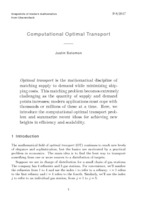| dc.contributor.author | Solomon, Justin | |
| dc.contributor.editor | Bruschi, David Edward | |
| dc.contributor.editor | Firsching, Moritz | |
| dc.contributor.editor | Cederbaum, Carla | |
| dc.date.accessioned | 2018-02-07T15:07:39Z | |
| dc.date.available | 2018-02-07T15:07:39Z | |
| dc.date.issued | 2017-12-21 | |
| dc.identifier.uri | http://publications.mfo.de/handle/mfo/1332 | |
| dc.description.abstract | Optimal transport is the mathematical discipline of
matching supply to demand while minimizing shipping
costs. This matching problem becomes extremely
challenging as the quantity of supply and demand
points increases; modern applications must cope with
thousands or millions of these at a time. Here, we
introduce the computational optimal transport problem
and summarize recent ideas for achieving new
heights in efficiency and scalability. | en |
| dc.language.iso | en | en |
| dc.publisher | Mathematisches Forschungsinstitut Oberwolfach | en |
| dc.relation.ispartofseries | Snapshots of modern mathematics from Oberwolfach;2017,08 | |
| dc.rights | Attribution-ShareAlike 4.0 International | * |
| dc.rights.uri | http://creativecommons.org/licenses/by-sa/4.0/ | * |
| dc.title | Computational Optimal Transport | en |
| dc.type | Article | en |
| dc.identifier.doi | 10.14760/SNAP-2017-008-EN | |
| local.series.id | SNAP-2017-008-EN | |
| local.subject.snapshot | Numerics and Scientific Computing | |
| dc.identifier.urn | urn:nbn:de:101:1-201802278226 | |
| dc.identifier.ppn | 1659214769 | |


